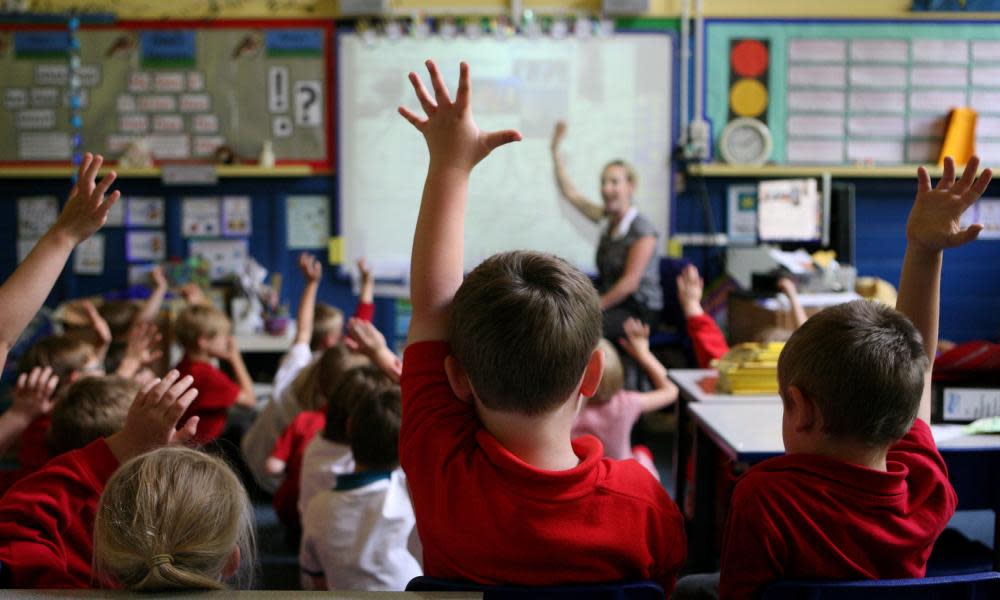With its fingers in its ears, this government is destroying our schools | Lola Okolosie

Propaganda for dummies would probably begin with the following instruction: repeat misinformation (what some might call a lie) often enough and it becomes truth. The principle has, despite its vile beginnings, proved useful to many in politics. We can recognise it in the rabidly misinformed wiretap tweets of Donald Trump. It was, of course, there in the Brexiters’ often repeated yet now abandoned pledge to pump £350m a week into our NHS. And now the Department for Education and its broad understanding of truth as it relates to squeezed school budgets.
As the department sees it, when it comes to funding, schools have never had it so good. They would be telling the truth only if they ignored little things like inflation and pupil numbers. Were we to take both factors into account, in real terms, spending per pupil, as projected by the Institute for Fiscal Studies, is set to drop by 6.5% within two years.
What we have is a Tory manifesto promise that has been scrapped: schools have not been protected from the cuts. A Cassandra-like chorus of teachers, parents, unions and now MPs trying to ring the alarm warn that English schools are careering towards a crisis. Could it be averted? Only if someone in government would listen.
Yesterday, amid the focus on Theresa May’s triggering of article 50, much less attention was spared for a damning report from the Commons public accounts committee. Concluding that the DfE “does not seem to understand the budget pressures facing schools”, it underscores its dressing down by pointing out that the DfE arrived at its figures using a “desk-based benchmarking exercise” – warning that children’s “futures are at risk if the DfE fails to act” on its findings. Yet the government body pressing schools to make £3bn in savings doesn’t seem to have a plan to check on how schools will drive down costs or if this will impact on children’s learning.
If we were being charitable we’d call the response from the DfE tone deaf, if not entirely delusional. It reproduces verbatim patter insisting that funding for schools is at the highest it has ever been. Again and again. That it has “protected the core schools budget in real terms since 2010, with school funding at its highest level on record at more than £40bn in 2016-17” is a tune played on loop.
Tell that to executive headteacher Graeme Atkins in Northumberland, who has been reduced to writing begging letters to parents asking for donations to help shrink his schools’ funding shortfall. Or Paul Wade, the headteacher at my local primary school, Parkwood in Hackney, east London, worried about how to keep his students safe if his boilers finally pack in or the cracks in the playground eventually become hazardous. Or to Richard Slade, headteacher at Plumcroft primary school in Greenwich, south-east London who, like so many, is unable to replace staff once they have left and is cutting support for pupils with special educational needs.
This is government education policy by way of the three wise monkeys: if you pretend a problem doesn’t exist and are deaf to alerts of a looming crisis, then what is there to discuss? But as most of us know, intoning “la la la” while sticking your fingers in your ears does not make a problem go away.
Today schools are faced with growing demand and the pressure to reduce their budgets. We are on approaching a perfect storm in which the poorest of pupils, those who by virtue of their poverty are statistically less likely to do well at school, will suffer the most. So much for all May’s talk of social mobility.
Earlier this year a broad selection of local authorities penned a joint letter to the education secretary, Justine Greening, asking that she invests in education to mitigate against the spending cuts. The councils, representing LAs across the country, were asking for an extra £335m. May’s grammar schools “vanity project” just happens to cost £320m. Clearly where there is a will, there is a way to access government coffers.
Today staff at Parkwood will be striking against the push towards an unsustainable dive to the bottom. A small school of eight classroom teachers, it is now set to lose its music, reading and maths recovery teachers. None will be replaced. Staff have foregone pay rises to cut costs. The school, which prides itself on ensuring every child is able to read by year three (age seven or eight) can no longer guarantee such excellent results with specialist staff gone. Basic equipment such as pencils, rulers, uniform and exercise books are proving difficult to come by.
Reception teacher and literacy coordinator Andrea Sumner told me how a faulty computer cable could only be replaced with money raised by parents. Indeed, parents of the reception class (age four to five) have been donating £1 a week this half-term to ensure the school can at least attempt to match the quality of provision once available to its pupils. This is the truth of what is happening to our schools.
However much the government may maintain its message discipline, it’s clear the rot has set in. These budget cuts are nothing less than the destruction of our schools.

 Yahoo News
Yahoo News 
